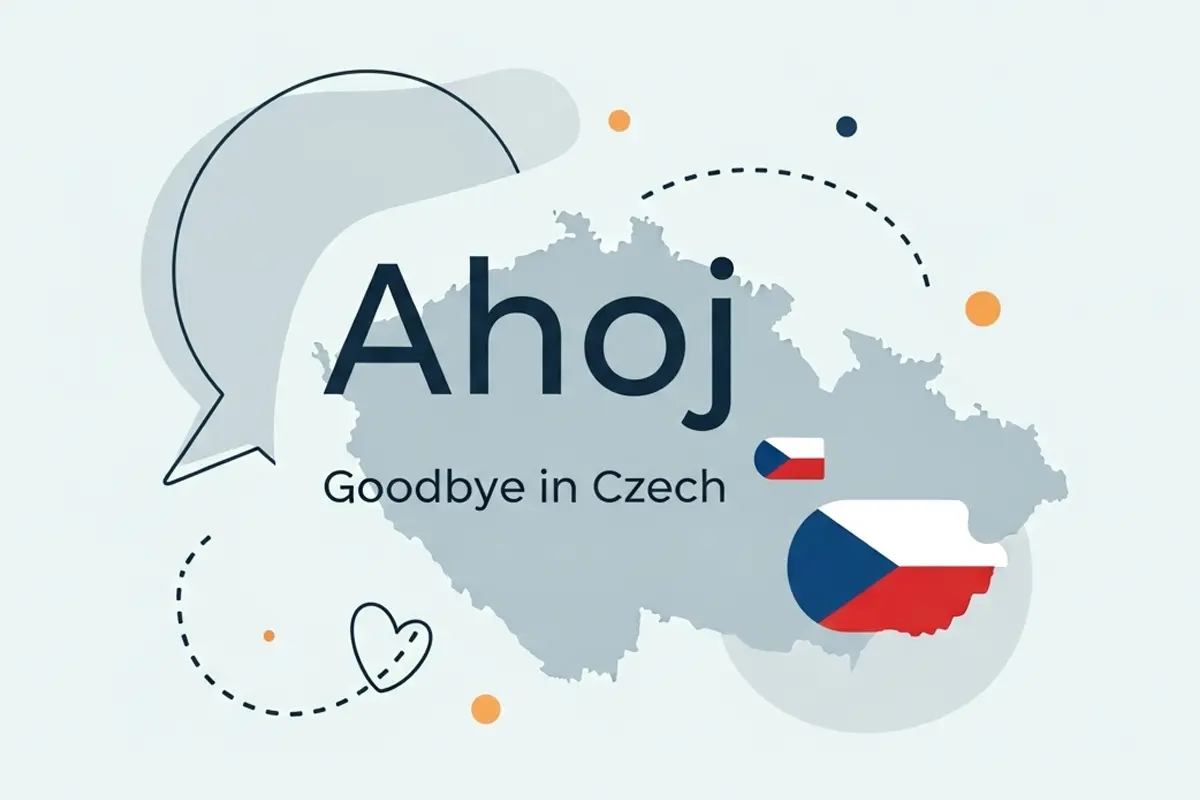
TL;DR
- The most common goodbye in Czech language is Na shledanou (nah skh-leh-dah-noh).
- Informal goodbyes include Čau, Ahoj, and Nashle.
- Use formal farewells in shops, offices, and with strangers; keep Čau/Ahoj for friends.
- Small etiquette cues (tone, eye contact, context) matter in Czech partings.
- See example dialogues, pronunciation tips, and usage notes below.
How to Say Goodbye in Czech Language? 🇨🇿
The standard way to say goodbye in Czech is Na shledanou (nah skh-leh-dah-noh), literally “until we see each other.” It’s the safest, most polite option in offices, stores, and any formal setting. You’ll also hear friendly goodbyes such as Čau, Ahoj, and the clipped Nashle (short for Na shledanou) in casual contexts (see typical usage in phrase lists compiled by resources like Locallingo and Omniglot’s Czech page).
Formal Czech Farewells: Showing Respect
When respect is expected, choose a polite form:
| Czech Phrase | English Meaning | Pronunciation | When to Use |
|---|---|---|---|
| Na shledanou | Goodbye | nah skh-leh-dah-noh | Default in formal/professional contexts |
| Na slyšenou | “Until we hear each other” | nah s-lee-sheh-noh | Phone calls; business calls |
| Mějte se hezky | Have a nice day | mnyay-teh seh hes-kee | Friendly-polite parting |
| Uvidíme se později | See you later | oo-vee-dee-meh seh pozh-dyay-yee | When you expect to meet again |
| Sbohem | Farewell (solemn) | sbo-hehm | Serious or final partings |
Usage note: Sbohem is weighty—think “farewell” rather than “bye.” It appears in literature and serious goodbyes (you’ll see this nuance mentioned in Czech learning portals and cultural notes, e.g., Radio Prague International).
Informal Goodbyes: How Friends and Locals Say It 👋
Czech has easy, friendly options among peers:
| Czech Phrase | English Meaning | Pronunciation | Context |
|---|---|---|---|
| Čau | Bye / Hi | chow | Casual, all-ages among friends |
| Ahoj | Hello / Bye | ah-hoy | Informal with people you know |
| Nashle | Short for Na shledanou | nah-shleh | Relaxed-but-polite |
| Zatím | See you for now | zah-teem | Temporary parting |
| Pa / Papa | Bye-bye | pah / pah-pah | Very informal; loved ones/kids |
If you’re building a broader travel toolkit, it helps to pair partings with everyday requests and greetings—our Common Czech Phrases for Travelers collects the must-know lines you’ll use before and after your goodbyes.
Friendly & Situational Goodbyes
Match your farewell to the situation:
| Situation | Czech Expression | English Equivalent | Pronunciation |
|---|---|---|---|
| Leaving work/shop | Hezký den! | Have a nice day! | |
| At night | Dobrou noc! | Good night | |
| After first meeting | Rád(a) jsem vás poznal(a). | Nice to meet you. | |
| Until tomorrow | Zítra na viděnou! | See you tomorrow! | |
| On the phone | Na slyšenou. | Talk to you later. |
Goodbyes often come with thanks in service settings. To sound complete and courteous, you can end with Děkuji, na shledanou (“Thank you, goodbye”). If you need help with phrasing thanks naturally, our How to Say Thank You in Czech breaks down formal and friendly options.
Czech Goodbye Etiquette 🇨🇿
Czech partings are typically brief, sincere, and context-aware:
- Use Na shledanou with staff, strangers, and elders.
- Keep Ahoj/Čau for equals and friends; using them with a boss or clerk can feel too familiar.
- A small smile and eye contact are polite; exaggerated enthusiasm is uncommon.
These tendencies reflect a broader preference for straightforward communication in the Czech Republic (you’ll find similar notes in cultural summaries and university language introductions, e.g., Charles University resources).
Common Mistakes by Learners (and Fixes)
| Mistake | Why It’s Off | Say Instead |
|---|---|---|
| Using Čau with strangers | Too informal for service/professional contexts | Na shledanou |
| Saying Sbohem casually | Sounds dramatic/final | Nashle or Mějte se hezky |
| Translating “Bye-bye” as “Baj baj” | Not idiomatic | Pa / Papa (very informal) |
| Ignoring phone-specific goodbye | Register mismatch | Na slyšenou on the phone |
Mini Czech Dialogue
Anna: Tak já už půjdu.
Petr: Dobře, měj se hezky!
Anna: Ty taky, čau!
Translation:
Anna: I’ll get going.
Petr: Okay, have a nice day!
Anna: You too, bye!
To keep leveling up beyond farewells, many learners tackle polite and affectionate phrases together—once you’re comfortable, explore how to express feelings naturally in I Love You in Czech for context beyond quick goodbyes.
Quick Comparison: English vs. Czech Goodbyes
| English | Czech | Formality |
|---|---|---|
| Goodbye | Na shledanou | Formal |
| Bye / See ya | Čau / Ahoj | Informal |
| See you later | Uvidíme se později | Neutral |
| Talk to you soon | Na slyšenou | Formal (phone) |
| Take care | Měj(te) se hezky | Friendly/Polite |
| Good night | Dobrou noc | Neutral |
FAQ: Goodbye in Czech
What’s the safest polite goodbye?
Na shledanou works in nearly any respectful situation (documented in phrase lists like Locallingo).
Is “Ahoj” rude?
No—just informal. Use it with friends, not with shop staff or in offices (see typical phrase guidance on Omniglot).
When do I say “Na slyšenou”?
On the phone—it literally means “until we hear each other.”
Why avoid “Sbohem” in daily chat?
It’s solemn/final, more like “farewell.”